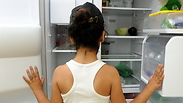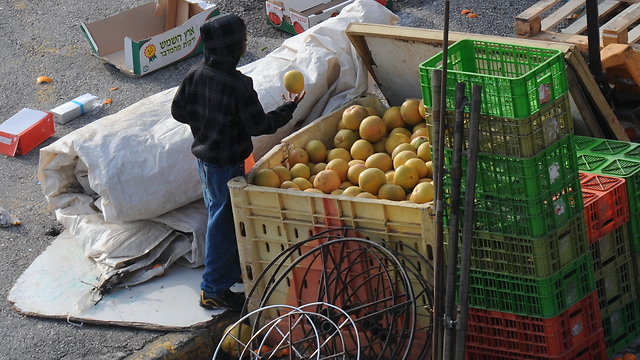
Rate of child poverty increased 55% in last 15 years
Report by Israel's National Council for the Child shows an increase in child poverty and child abuse in Israel; President Rivlin harshly criticizes unbearable situation.
A report released on Thursday by the Israel National Council for the Child (NCC) noted that while a decrease was noted in the number of poor children in Israel in 2013, there was a 55 percent increase in child poverty overall in Israel over the past 15 years.
The report also noted a rise in the number of children suffering abuse, and placed Israel in first place for the risk of child poverty among OECD countries.
At the end of 2013, there were 2,682,169 children in Israel, constituting 32.9 percent of the population. The number of children living in poverty in 2013 was 826,105.
While there was a minor decline in child poverty from the previous year, the situation is still dire. Moreover, 30.8 percent of Israeli children live in poverty, and in the past three decades the percent of children living in poverty increased four fold (from 8.1 percent in 1980 to 30.8 percent in 2013).
NCC researchers noted that it is possible that the minor decline in the number of children living in poverty in 2013 compared to 2012 was a result of a change in the system of measurement, rather than an actual decline in poverty rates.
Less aid to poor children
In 2013, 1/5 of Jewish children and 2/3 (66.4 percent) of non-Jewish children were living under the poverty line in Israel. During that year, only 4.9 percent of poor children were able to escape poverty thanks to transfer payments, compared to 10.5 percent in 2000.
Since 2000, the ability to transfer payments and taxes to minimize the rates of poverty due to cuts in stipends has been limited. As a result, more and more impoverished children get less and less aid.
There was a clear growth from 2006 in the percent of students reporting they have to go to school or even to bed hungry because they have no food at home. This issue is especially prominent among Arab boys (some 37.1 percent).
The report also found that the more children there are in a family, the larger the rate of poverty. The percent of poor families with four children or more after transfer payments and taxes was 52.3 percent in 2013, and in families of five children or more, the rate of poverty was 60 percent.
In 2013, 66.4 percent of Arab children in Israel were living in poverty. This is a one percent increase from 2010, and an amount over three times higher than the amount of Jewish children (20 percent) living in poverty.
An international comparison found that 38.6 percent of Israeli children were at risk of finding themselves under the poverty line, compared to 19.7 percent - the average in OECD countries. This puts Israel at first place in risk of child poverty.
Child Abuse
The report also examined the situation of victims of abuse.
In 2014, 441,167 children were being handled by the welfare authorities, some 17 percent of Israeli children. A record number of suspected abuse of children was reported in 2013: 49,744 reports compared to 48,894 in 2012.
Between the years 1995-2013, this number increased by 195.8 percent (from 16,815 to 49,744). About one third of reports were of physical abuse, about one tenth of the reports were of sexual abuse, a similar amount of reports concerned mental abuse and a quarter of reports dealt with neglect.
The situation in the Arab sector is even worse, according to the report. In almost all types of child abuse, Arab children were affected more than Jewish children. The major gaps were in physical neglect (29.2 percent among Jews, 49 percent among Arabs) and physical abuse (28.8 percent among Jews, 40.5 percent among Arabs).
In 2013, 72.6% of the cases of offenses committed against children related to incidents outside the family – 6,180 cases. Furthermore, 30.4 percent of them were for sexual offenses and 65.7 for assault of a minor.
Between 1998 and 2013, the number of cases opened for offenses against minors outside the family was larger than those committed with the family. In those years, a 33.7 percent increase was noted in the amount of cases opened.
Over a million children living in severe distress
"Most children in Israel live well and their basic rights are kept, however a large and significant number of Israeli children suffer very much," said NCC Director Dr. Yitzchak Kadman. "Hundreds of thousands suffer from poverty, economic shortages and from social exclusion because of it. Hundreds of thousands are in high risk and in grave danger. Even if you take into account the fact that there are certain overlaps between the groups of children, we still reach massive numbers and a well-based estimate of over a million children in Israel living in severe distress, in high risk and in danger."
"This is an unbelievable and unbearable number that must keep all of us up at night, especially the decision-makers and policy setters. In the past 40 years, the number of children in Israel increased by 120 percent. Did the number of social workers, school counselors, pediatricians and child psychologists increase by a similar or close rate? The answer is unequivocally – no. It's time to wake up, invest in children, view them as an asset and not a burden and ensure all children in Israel have a happy childhood, not just most of them," Kadman concluded.
President Reuven Rivlin, who received the report from Kadman on Thursday, said: "A society that doesn't take care of its helpless citizens should be ashamed of itself. A society that is not interested in taking care of its helpless citizens is not worthy of being called a society."
Rivlin went on to say that the fact Israel has a relatively young population, compared to the rest of the developed world, is the very reason why it "must not ignore the circles of poverty, distress and risk, especially in closed societies, like the Arab and Haredi societies."
The Labor party also responded to the report, saying that "While the prime minister is busy with imaginary APCs, a social avalanche in the form of over 800,000 poor children is happening right under his nose."
The Labor party went on to accuse the government of "completely failing in the implementation of a program to end poverty because it did not understand that this is a threat that could dissolve Israeli society from within."
"In order for children to not go to sleep hungry, we need a serious multi-year plan that will be appropriately budgeted and present goals to minimizing poverty. This is one of the central goals we will have in mind when we put together the next government," the Labor party continued.
Aryeh Deri, the chairman of ultra-Orthodox (Haredi) party Shas, said that "pushing the Shas movement to the opposition has dramatically exacerbated the rates of poverty among Israeli children. This is a brutal government, without a conscience or a compass, and the children of Israel have become hostages of its policies. The hungry mouths need a political mouth. It turns out satiation has proper representation, while poverty, meagerness and shortage have no spokesmen or representatives in the government, whose policy increases the rate of poverty among children and endangers the future."
Roi Yanovsky and Moran Azulay contributed to this report.











